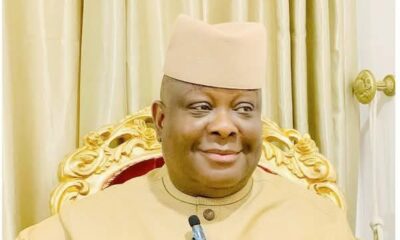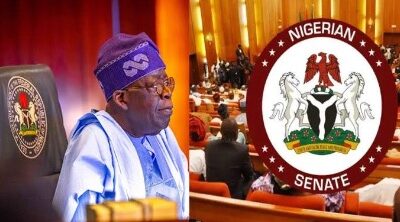News
Felons aren’t welcome: all the countries Trump can’t visit
Travel becomes more complicated for convicted felons. This is a factor that Donald Trump will need to consider when making travel plans in the future.

Performing his diplomatic duties might be very challenging for Donald Trump if he is elected president in November. As a convicted felon there is now a very long list of countries where Trump will be banned from entry.

According to World Population Review, many countries bar convicted felons from entry. Thirty-eight nations, including the United States, ban convicted felons outright from entering their countries.

As reported by People magazine, the bans are enforced even if the convicted individual is still allowed to retain their passport. This could potentially make Donald Trump’s political life significantly more challenging if he were to return to the White House, adding a layer of uncertainty to his future.

However, it is true that in some cases, the international government may decide to make an exception for Donald Trump, particularly if he requested special permission to visit the country as the president of the United States.

Ironically, Trump himself has often called foreigners coming to the United States criminals, and now he himself will be a foreign convicted criminal hoping to enter another country.

Regardless, the list of countries that ban convicted felons from visiting is extensive, and many of these countries are either US allies or nations crucial for Trump’s foreign policy engagements. This situation could significantly impact Trump’s international relations. Click on to see all the countries Trump is banned from visiting.

Both Canada and Mexico ban convicted felons from entering the country. These countries are the United States’ closest neighbors, so it could really make life difficult for Trump.

Technically Cuba is considered part of North America, and Trump likely wouldn’t be traveling there, but even if he wanted to, he would be banned from entry.

There are four countries in South America that ban convicted felons from entry: Argentina, Brazil, Chile, and Peru.

There are four countries in South America that ban convicted felons from entry: Argentina, Brazil, Chile, and Peru.

While not technically in South America, the Dominican Republic also isn’t interested in receiving criminals and bans convicts from entering.

Donald Trump, surprisingly can visit most European countries as a convicted felon. However, there are a few countries where he is banned, including the United Kingdom and Ireland, both close US allies. In addition he won’t be able to visit Turkey or Ukraine.

When it comes to Asia, things are pretty strict, and there are very few countries that Trump could travel to. Convicted felons are banned from: Cambodia, China, Hong Kong, India, Indonesia, Japan, Malaysia, Macao, Philippines, Singapore, Nepal, South Korea, and Taiwan.

Trump may have to cancel any plans to go on an African safari in the future. As a convicted felon he is persona non grata in Kenya, Morocco, South Africa, Tanzania, and Tunisia.

Trump’s political life, if elected, would be further complicated by the inability to make diplomatic trips to visit American allies Australia and New Zealand as both countries have bans on felons entering.

And when it comes to the Middle East Trump is banned from entering Egypt, Iran, the United Arab Emirates, and I s r a e l. However, we think I s r a e l would likely make an exception for Trump, as the country’s leader has his own legal troubles, the president of I s r a e l is wanted by the ICC.

Of course, if Trump does win in November, we have a pretty good feeling one of the first things he will attempt to do is give himself a clean slate by granting his own presidential pardon. That’s too bad because it would have been fun seeing him suffer trying to enter all those countries.
See also: Could Trump pardon himself as president?
News
EFCC Arrests Herbalists with $3.4million, €280, 000 Counterfeit Notes in Osun, Lagos

Operatives of the Ibadan Zonal Directorate of the Economic and Financial Crimes Commission, EFCC, have uncovered huge counterfeit foreign notes to the tune of $3, 430, 000 (Three Million, Four Hundred and Thirty Thousand United States Dollars) and €280, 000 (Two Hundred and Eighty Thousand Euros) in possession of a five-member syndicate arrested for allegedly swindling one Halima Sanni the sum of N26, 550, 000 (Twenty-Six Million, Five Hundred and Fifty Thousand Naira).
The herbalists: Akingbola Omotayo, Adeola Funsho Ogunrinde, Yahaya Amodu, Kubratu Babalola Olaitan (female) and Familola Sunday Olaitan. were arrested on December 7 and 8, 2025 at their shrines in Osun and Lagos States respectively, following a thorough surveillance and intelligence on their fraudulent activities
Investigation revealed that the suspects were allegedly defrauding unsuspecting individuals of their legitimate earnings under the pretence of providing spiritual cleansing and solutions to different ailments.
They also allegedly assured their victims of their powers to conjure several currency notes which must be cleaned up by a genie through spiritual sacrifice before spending the money. They did all these by hypnotizing their victims to provide money for the sacrifice.
Other items recovered from them include two exotic cars and mobile phones.
The suspects will be charged to court as soon as investigations are concluded.



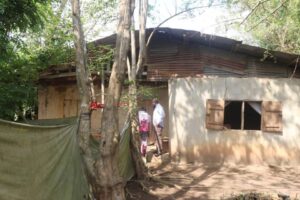
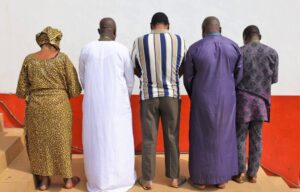
News
HAPPENING NOW: US Air Force Takes Over Benin-Nigeria Border Airspace, Wipes Out ISWAP Terrorists’ Armory

Without taking chances, the United States Air Force entered the airspace of Benin-Nigeria border without using the Nigerian airport, stepped up reconnaissance and massive attack against militants and it had begun the operation now in blasting the armory of the terrorists.
According to Standard Newspaper Inc USA, Corroborating this view, Bryant Philip, a top American security operative with specialty in West Africa law enforcement confirmed the latest development by explaining that the United States Air Force ISR aircraft is on an on-going mission above
His words: “The United States Air Force ISR aircraft is currently operating above the Babana strategic crossing on the Benin-Nigeria border. This route has long been used by armed groups, particularly JNIM, for smuggling supplies. In August, the Nigerian army clashed with unidentified gunmen.


“The United States resumes ISR missions today in Nigeria, targeting ISWAP zones of influence in Borno State, northeast Nigeria, on the fringes of Lake Chad. It took off from Accra, Ghana. Still not using a Nigerian airport.”
Meanwhile, the Nigerian Army Elite Group, Maroon Beret famously described as Boko Haram’s nightmare stormed the secret enclave of the terrorists’ group and killed over 50 members of the notorious sect inside their make-shift huts in the forest.

As at press time, some 200 West African soldiers, mainly from Nigeria and Ivory Coast, are in Benin Republic to support the government following the failed coup, Benin’s foreign minister says.
Remember, the attempt was foiled after Nigeria deployed fighter jets to drive the mutineers out of a military base and state TV headquarters, where they had declared a takeover.
This is the first time that officials have said how many foreign soldiers were deployed to the country, although it is not clear if some have been withdrawn.

Benin’s Foreign Affairs Minister Olushegun Adjadi Bakari on Thursday said some of the regional troops sent to help had remained in the country “as part of the sweep and clean-up operation”.
The West African regional bloc, ECOWAS, deployed troops from Nigeria, Ghana, Sierra Leone, and Ivory Coast to secure key installations and prevent any resurgence of the violence.
Nigeria, Benin’s large neighbour to the east, said its soldiers had reached there since a few days ago, describing the coup attempt as a “direct assault on democracy”.
Security intelligence showed 50 soldiers from the country had been sent as part of the regional deployment.
“There are currently around 200 soldiers present, who came to lend a hand at the end of the day to the Beninese defence and security forces as part of the sweep and clean-up operation,” said Bakari, while addressing journalists in Nigeria’s capital, Abuja, on Thursday.
Bakari, who was speaking alongside Nigeria’s Foreign Affairs Minister Yusuf Maitama Tuggar, said that by the time the Beninese forces called for help, the coup “was already a failure”.
“When we started discussions for the intervention of Nigeria and the others, under ECOWAS protocol, our military had already pushed them back,” he added.
According to Bakari, what was required was “precise aerial back-up to carry out a surgical operation that targeted the enemy’s key positions without risking civilian casualties”.
Tuggar said that fast diplomatic, military, and intelligence actions between Nigeria and Benin had helped to foil the coup.
Discussions are continuing over how long the regional forces would remain, but Bakari said any decision “will be taken in close collaboration with Benin’s defence and security forces, who have demonstrated their bravery”.
It is not clear if the French special forces who also reportedly helped loyalist troops thwart the coup are still in Benin.
Under intense pressure after a string of successful coups in the region, Ecowas is signaling that it is no longer willing to watch democratically elected governments be toppled by the military.
Bakari praised ECOWAS as “an important tool that allows us to defend democracy and the values of democracy in our regional space”.
News
What Buhari did when he heard rumors that I planned to kill him – Aisha
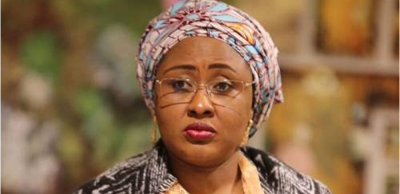
Former First Lady Aisha Buhari has disclosed that her late husband, former President Muhammadu Buhari, locked himself inside his room after believing rumors within Aso Rock that she planned to kill him.
The revelation was contained in a new biography titled From Soldier to Statesman: The Legacy of Muhammadu Buhari, written by Dr Charles Omole and launched at the State House on Monday, December 16, 2025.
The book follows Buhari’s life journey from his early years in Daura, Katsina State, to his final days in a London hospital in mid-July 2025.
According to the account, Aisha Buhari said gossip and fear inside the Presidential Villa created tension that affected her husband’s daily life.
She stated that for about a week, Buhari believed the rumours, became cautious, changed his habits, and started locking his room.
During this period, his meals were delayed or missed, and the supplements he depended on were stopped.
She explained that this disruption marked the beginning of the health crisis that later forced Buhari to take long medical leave in 2017.
She maintained that the illness was not caused by poisoning or any hidden disease but by the breakdown of a feeding and nutrition routine she had managed for years.
The book stated that Aisha Buhari had always supervised her husband’s meals and supplements at fixed times, even before he became president.
She described Buhari as someone with a long history of nutrition-related weakness who depended on a strict routine to stay strong.
After moving into Aso Villa, she reportedly met with close aides, including security and medical officials, to explain the importance of the plan.
However, the routine gradually collapsed. Aisha Buhari said that for nearly a year, her husband stopped eating lunch and his meals were poorly managed.
His condition worsened and led to two extended medical trips to the United Kingdom in 2017, lasting a total of 154 days. During his absence, Vice President Yemi Osinbajo handled presidential duties.
After returning to Nigeria, Buhari admitted that he had never been that ill before and confirmed receiving blood transfusions.
The book said that his prolonged absence led to widespread rumours and speculation across the country.
Aisha Buhari rejected claims that there were attempts to poison her husband, insisting that the real cause of the crisis was the loss of his nutrition routine.
In London, doctors placed Buhari on a stronger supplement plan.
At first, he was afraid and reluctant to take them, but she took charge of his care and ensured he received the prescribed supplements through his meals.
She described the recovery as rapid, saying that within days Buhari no longer needed support to walk and soon began receiving visitors.
The book stated that this marked both the beginning and the end of the illness.
Dr Omole also addressed criticism over Buhari’s repeated medical treatment abroad, saying that an elderly man in his seventies may require specialised care not easily available in Nigeria due to years of weak investment in healthcare.
He added that Buhari’s habit of formally handing over power during absences showed respect for due process.
The book further described an atmosphere of mistrust around the Presidency. Aisha Buhari alleged that the President’s office was monitored and private conversations replayed, adding that fear within the system affected his wellbeing. She also dismissed claims that Buhari had a body double, describing the story as false and blaming poor communication for allowing such rumors to grow.
-
Business1 year ago
US court acquits Air Peace boss, slams Mayfield $4000 fine
-

 Trending1 year ago
Trending1 year agoNYA demands release of ‘abducted’ Imo chairman, preaches good governance
-

 Politics1 year ago
Politics1 year agoMexico’s new president causes concern just weeks before the US elections
-

 Politics1 year ago
Politics1 year agoPutin invites 20 world leaders
-

 Politics1 year ago
Politics1 year agoRussia bans imports of agro-products from Kazakhstan after refusal to join BRICS
-
Entertainment1 year ago
Bobrisky falls ill in police custody, rushed to hospital
-
Entertainment1 year ago
Bobrisky transferred from Immigration to FCID, spends night behind bars
-
Education1 year ago
GOVERNOR FUBARA APPOINTS COUNCIL MEMBERS FOR KEN SARO-WIWA POLYTECHNIC BORI

